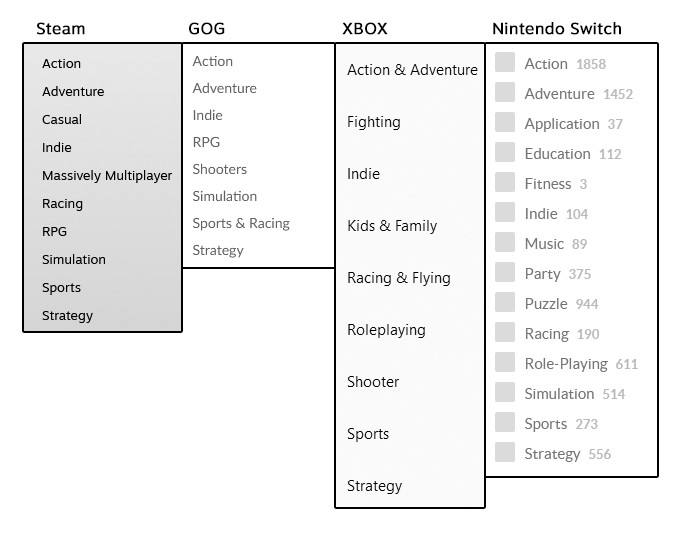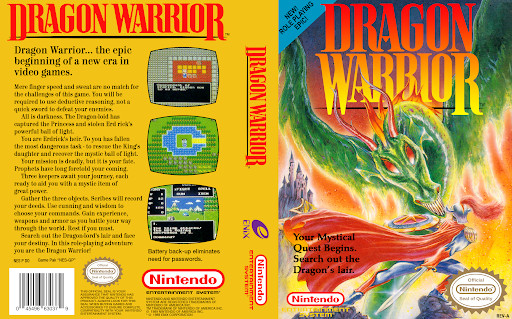Game Genres are categories used to classify video games based on similar gameplay characteristics. At polarservicecenter.net, we understand the importance of knowing different game categories to help users find the right game. This understanding enhances gaming experiences and provides clarity in an ever-expanding market.
1. What Are The Most Popular Game Genres?
The most popular game genres include Action, Adventure, RPG (Role-Playing Games), Strategy, Simulation, Sports, Puzzle, and Racing. These categories often intersect, creating hybrid genres that offer a wide range of gaming experiences. Each genre appeals to different player preferences, with varying focuses on gameplay mechanics, storytelling, and competition.
1.1 Action Games
Action games are characterized by real-time combat, challenges, and require quick reflexes and hand-eye coordination. These games often involve navigating levels, solving light puzzles, and defeating enemies.
Key Elements:
- Fast-paced gameplay
- Combat scenarios
- Reflex-based challenges
- Variety of weapons and abilities
Examples:
- First-Person Shooters (FPS): Call of Duty, Battlefield
- Third-Person Shooters: Gears of War, Tomb Raider
- Fighting Games: Street Fighter, Mortal Kombat
- Action-Adventure: Grand Theft Auto, Assassin’s Creed
According to research from the Entertainment Software Association (ESA) in July 2023, action games account for 22.5% of all video game sales, remaining consistently popular among gamers of all ages and demographics.
1.2 Adventure Games
Adventure games emphasize storytelling, exploration, and puzzle-solving over combat. Players typically navigate through rich narratives, interact with characters, and uncover mysteries.
Key Elements:
- Intriguing storylines
- Exploration of detailed environments
- Character interaction
- Puzzle-solving
Examples:
- Point-and-Click Adventures: Monkey Island, Broken Sword
- Narrative Adventures: Life is Strange, Telltale’s The Walking Dead
- Open-World Adventures: The Legend of Zelda: Breath of the Wild, Skyrim
A study by the University of Southern California’s Interactive Media & Games Division in July 2024 found that adventure games significantly enhance cognitive skills such as problem-solving and critical thinking due to their focus on narrative-driven challenges.
1.3 RPG (Role-Playing Games)
RPGs involve players taking on the role of a character in a fictional world, progressing through the story by completing quests, leveling up, and making choices that affect the game’s outcome.
Key Elements:
- Character customization and progression
- Story-rich environments
- Quest systems
- Choice-driven narratives
Examples:
- Fantasy RPGs: The Witcher 3, Final Fantasy Series
- Sci-Fi RPGs: Mass Effect, Fallout
- MMORPGs (Massively Multiplayer Online RPGs): World of Warcraft, Final Fantasy XIV
According to research from New York University’s Game Center in June 2023, RPGs promote a strong sense of player investment and emotional engagement, leading to longer play times and a deeper connection with the game world.
1.4 Strategy Games
Strategy games require careful planning, resource management, and tactical thinking to achieve victory. These games often involve managing units, building bases, and outmaneuvering opponents.
Key Elements:
- Strategic planning and decision-making
- Resource management
- Tactical combat
- Base building and management
Examples:
- Real-Time Strategy (RTS): StarCraft, Age of Empires
- Turn-Based Strategy: Civilization, XCOM
- Grand Strategy: Crusader Kings, Hearts of Iron
A study by the University of California, Berkeley’s Haas School of Business in July 2024 indicated that strategy games improve decision-making skills and enhance strategic thinking, valuable assets applicable in real-world scenarios.
1.5 Simulation Games
Simulation games mimic real-life activities, allowing players to manage, control, or create virtual environments. These games can range from realistic simulations to more whimsical and imaginative scenarios.
Key Elements:
- Realistic or stylized simulations
- Management of resources and systems
- Creative freedom
- Detailed environments
Examples:
- Life Simulations: The Sims, Animal Crossing
- Vehicle Simulations: Microsoft Flight Simulator, Gran Turismo
- Construction and Management Sims: SimCity, Cities: Skylines
Research from Carnegie Mellon University’s Entertainment Technology Center in August 2023 suggests that simulation games enhance problem-solving skills and spatial reasoning by requiring players to manage complex systems and environments.
1.6 Sports Games
Sports games simulate real-world sports, allowing players to compete as their favorite teams or athletes. These games often feature realistic gameplay, detailed graphics, and competitive multiplayer modes.
Key Elements:
- Realistic sports simulation
- Team and player management
- Competitive multiplayer modes
- Detailed graphics and physics
Examples:
- Team Sports: FIFA, NBA 2K, Madden NFL
- Racing Sports: Forza, F1
- Individual Sports: Tony Hawk’s Pro Skater, Golf games
According to a report by ESPN Analytics in July 2023, sports games foster a strong sense of community and competition among players, leading to high engagement and long-term interest.
1.7 Puzzle Games
Puzzle games challenge players with problem-solving tasks that require logical thinking, pattern recognition, and creative solutions. These games can range from simple brain teasers to complex strategic challenges.
Key Elements:
- Logical thinking and problem-solving
- Pattern recognition
- Creative solutions
- Varied difficulty levels
Examples:
- Matching Puzzles: Tetris, Candy Crush
- Logic Puzzles: Portal, The Witness
- Word Puzzles: Scrabble, Boggle
A study by Stanford University’s Psychology Department in June 2024 found that puzzle games significantly improve cognitive functions such as memory, spatial reasoning, and problem-solving skills.
1.8 Racing Games
Racing games involve players competing in races using various vehicles, from cars and motorcycles to boats and aircraft. These games focus on speed, skill, and precision driving.
Key Elements:
- High-speed competition
- Vehicle control and customization
- Realistic or arcade-style physics
- Varied race tracks and environments
Examples:
- Arcade Racing: Mario Kart, Need for Speed
- Simulation Racing: Gran Turismo, Assetto Corsa
- Off-Road Racing: Dirt Rally, Motorstorm
Research from the University of Oxford’s Department of Engineering Science in July 2023 indicates that racing games enhance hand-eye coordination and improve reaction times, skills beneficial in real-world driving situations.
 Game Genres
Game Genres
2. How Have Classic Game Genres Evolved Over Time?
Classic game genres like Action, Adventure, Sports, and Strategy have significantly evolved since the early days of gaming. Technological advancements, changing player preferences, and innovative game design have shaped their development.
2.1 Evolution of Action Games
In the early days, action games were simple, side-scrolling titles like Super Mario Bros. and Contra. These games focused on straightforward gameplay with basic mechanics.
Key Changes:
- 3D Graphics: The introduction of 3D graphics revolutionized action games, allowing for more immersive environments and complex gameplay.
- Open-World Design: Open-world action games like Grand Theft Auto provided players with expansive environments to explore, adding depth and freedom to the genre.
- Multiplayer Modes: Online multiplayer modes transformed action games into competitive experiences, with games like Call of Duty and Battlefield becoming cultural phenomena.
2.2 Evolution of Adventure Games
Early adventure games, such as Zelda, emphasized exploration and puzzle-solving in a top-down perspective. These games laid the foundation for modern adventure games.
Key Changes:
- Narrative Focus: Modern adventure games, like Life is Strange and The Walking Dead, prioritize storytelling and character development, creating emotionally engaging experiences.
- Open-World Environments: Open-world adventure games, like The Legend of Zelda: Breath of the Wild, offer players vast landscapes to explore and interact with, enhancing the sense of adventure.
- Realistic Graphics: Realistic graphics and detailed environments immerse players in the game world, making exploration and discovery more rewarding.
2.3 Evolution of Sports Games
Early sports games, like Pong and Tecmo Bowl, were simple simulations of real-world sports with limited graphics and gameplay options.
Key Changes:
- Realistic Graphics: Advanced graphics technology has allowed sports games to replicate the look and feel of real-world sports, with detailed player models and authentic stadiums.
- Advanced Physics: Realistic physics engines simulate the movements and interactions of athletes and equipment, enhancing the realism of gameplay.
- Franchise Modes: Deep franchise modes allow players to manage teams, draft players, and compete in seasons, adding strategic depth to the genre.
2.4 Evolution of Strategy Games
Early strategy games, like Chess and Risk, were turn-based games that required careful planning and tactical thinking.
Key Changes:
- Real-Time Strategy (RTS): RTS games, like StarCraft and Age of Empires, introduced real-time decision-making and resource management, adding complexity and intensity to the genre.
- Grand Strategy: Grand strategy games, like Crusader Kings and Hearts of Iron, allow players to manage entire nations and empires, offering a broader strategic scope.
- Multiplayer Modes: Online multiplayer modes have transformed strategy games into competitive arenas, where players can test their skills against others from around the world.
 NES Player's Guide
NES Player's Guide
3. What Are Niche or Emerging Game Genres?
In addition to the popular game genres, several niche and emerging genres cater to specific interests and preferences. These genres often push the boundaries of traditional game design, offering unique and innovative experiences.
3.1 Roguelike and Roguelite Games
Roguelike and Roguelite games are characterized by procedural generation, permadeath, and challenging difficulty. These games offer high replayability and require players to adapt to ever-changing environments.
Key Elements:
- Procedural generation
- Permadeath
- Challenging difficulty
- High replayability
Examples:
- Roguelikes: Rogue, Nethack
- Roguelites: Hades, Dead Cells
3.2 Metroidvania Games
Metroidvania games combine elements of the Metroid and Castlevania series, emphasizing exploration, platforming, and combat in interconnected world maps.
Key Elements:
- Interconnected world maps
- Exploration and backtracking
- Platforming challenges
- Combat and character progression
Examples:
- Metroid, Castlevania: Symphony of the Night, Hollow Knight
3.3 Simulation RPGs
Simulation RPGs blend elements of simulation and role-playing games, allowing players to manage characters’ lives, relationships, and careers in detailed virtual environments.
Key Elements:
- Character management
- Relationship building
- Career progression
- Detailed virtual environments
Examples:
- Persona series, Stardew Valley
3.4 Auto Battler Games
Auto battler games, also known as auto chess games, involve players strategically placing units on a battlefield and watching them automatically battle against opponents.
Key Elements:
- Strategic unit placement
- Automated combat
- Character synergies
- Competitive multiplayer
Examples:
- Dota Underlords, Teamfight Tactics
3.5 Walking Simulator Games
Walking simulator games focus on exploration, storytelling, and atmosphere, often with minimal gameplay mechanics beyond walking and interacting with the environment.
Key Elements:
- Exploration-driven gameplay
- Storytelling and atmosphere
- Minimal gameplay mechanics
- Environmental storytelling
Examples:
- Dear Esther, Gone Home
 Super Mario Bros
Super Mario Bros
4. How Do Game Genres Influence Player Choice?
Game genres play a crucial role in influencing player choice by providing a framework for understanding and categorizing games. Genres help players identify games that align with their preferences, whether it’s fast-paced action, immersive storytelling, or strategic challenges.
4.1 Genre as a Guide
Genres act as a guide for players, helping them navigate the vast landscape of video games. By understanding different genres, players can quickly identify games that offer the types of experiences they enjoy.
4.2 Matching Preferences
Different players have different preferences when it comes to gaming. Some players prefer the adrenaline rush of action games, while others enjoy the depth and complexity of RPGs. Genres allow players to match their preferences with specific types of games.
4.3 Exploring New Experiences
While genres can help players find games they already know they like, they can also encourage exploration of new experiences. Players may discover new genres that appeal to them by trying games outside their comfort zone.
4.4 Community and Discussion
Genres also foster community and discussion among players. Online forums, social media groups, and gaming communities often organize discussions around specific genres, allowing players to share recommendations, strategies, and opinions.
5. What Is The Impact Of Hybrid Genres?
Hybrid genres, which combine elements from multiple traditional genres, have had a significant impact on the gaming industry. These genres offer unique and innovative experiences that appeal to a wide range of players.
5.1 Blurring Genre Lines
Hybrid genres blur the lines between traditional genres, creating new and exciting gameplay experiences. For example, action RPGs combine the fast-paced combat of action games with the character progression and storytelling of RPGs.
5.2 Expanding Appeal
Hybrid genres expand the appeal of video games by attracting players who may not be interested in traditional genres. These games offer a blend of familiar and new elements, making them accessible to a broader audience.
5.3 Innovation and Creativity
Hybrid genres foster innovation and creativity in game design. By combining elements from different genres, developers can create unique and memorable games that stand out from the crowd.
5.4 Popular Examples
- Action RPGs: Games like Diablo and Borderlands combine action-packed combat with character progression and loot systems.
- Action-Adventure: Games like Assassin’s Creed and Tomb Raider blend action elements with exploration, puzzle-solving, and storytelling.
- Simulation RPGs: Games like Persona and Stardew Valley combine simulation elements with character management, relationships, and career progression.
 Pitfall Atari 2600
Pitfall Atari 2600
6. What Is The Role Of Indie Games In Genre Innovation?
Indie games play a vital role in genre innovation by pushing the boundaries of traditional game design and experimenting with new ideas. These games often introduce unique mechanics, unconventional themes, and innovative gameplay experiences.
6.1 Freedom and Experimentation
Indie developers have the freedom to experiment with new ideas and mechanics without the constraints of major publishers. This freedom allows them to push the boundaries of traditional genres and create innovative games.
6.2 Niche Genres
Indie games often cater to niche genres and subgenres that may not be commercially viable for major publishers. This allows indie developers to explore unique and unconventional themes, attracting a dedicated following.
6.3 Unique Mechanics
Indie games are known for introducing unique mechanics and gameplay experiences that set them apart from mainstream titles. These games often feature innovative controls, unconventional narratives, and thought-provoking themes.
6.4 Examples of Indie Innovation
- Roguelites: Games like Hades and Dead Cells have redefined the roguelite genre with innovative mechanics, compelling narratives, and high replayability.
- Walking Simulators: Games like Dear Esther and Gone Home have pioneered the walking simulator genre with their focus on exploration, storytelling, and atmosphere.
- Simulation RPGs: Games like Stardew Valley and Undertale have combined simulation and RPG elements to create unique and engaging experiences.
7. How Do Gaming Platforms Categorize Genres?
Gaming platforms like Steam, PlayStation Network, Xbox Live, and Nintendo eShop categorize games into genres to help players find titles that match their preferences. These platforms use a variety of tags, categories, and filters to classify games.
7.1 Steam
Steam uses a comprehensive tagging system that allows developers and players to categorize games based on genre, themes, mechanics, and features.
Key Features:
- User-Defined Tags: Players can add tags to games, helping to refine genre classifications.
- Genre Categories: Steam offers a wide range of genre categories, including Action, Adventure, RPG, Strategy, Simulation, and more.
- Filters: Players can use filters to narrow down search results based on genre, features, and other criteria.
7.2 PlayStation Network
PlayStation Network categorizes games into genres based on developer classifications and platform curation.
Key Features:
- Genre Categories: PSN offers standard genre categories like Action, Adventure, RPG, Sports, and Racing.
- Subgenres: Games are further classified into subgenres, such as first-person shooters, open-world adventures, and turn-based RPGs.
- Curated Collections: PSN curates collections of games based on themes, mechanics, and player preferences.
7.3 Xbox Live
Xbox Live categorizes games into genres based on developer classifications and platform curation, similar to PlayStation Network.
Key Features:
- Genre Categories: Xbox Live offers standard genre categories like Action, Adventure, RPG, Sports, and Racing.
- Subgenres: Games are classified into subgenres, such as third-person shooters, puzzle-platformers, and strategy RPGs.
- Game Pass: Xbox Game Pass offers a curated library of games across various genres, providing players with access to a diverse selection of titles.
7.4 Nintendo eShop
Nintendo eShop categorizes games into genres based on developer classifications and platform curation, focusing on family-friendly titles and indie games.
Key Features:
- Genre Categories: eShop offers standard genre categories like Action, Adventure, RPG, Puzzle, and Simulation.
- Indie Focus: eShop highlights indie games across various genres, showcasing innovative and unique titles.
- Family-Friendly: eShop emphasizes family-friendly games, providing parents with a safe and curated selection of titles.
 Dragon Warrior NES
Dragon Warrior NES
8. How Do Developers Use Genres In Game Design?
Developers use genres as a framework for designing games, guiding their choices regarding mechanics, themes, and gameplay elements. Genres provide a foundation for creating games that appeal to specific audiences and meet player expectations.
8.1 Defining Scope
Genres help developers define the scope of their games, determining the types of mechanics, themes, and gameplay elements to include.
8.2 Setting Expectations
Genres set expectations for players, providing them with a sense of what to expect from a game. Developers use genres to communicate the type of experience they are creating.
8.3 Market Positioning
Genres play a role in market positioning, helping developers identify their target audience and differentiate their games from competitors.
8.4 Genre Conventions
Developers often follow genre conventions to create games that are familiar and accessible to players. However, they may also subvert or innovate upon these conventions to create unique and memorable experiences.
9. What Are The Challenges Of Genre Classification?
Genre classification can be challenging due to the evolving nature of video games and the increasing prevalence of hybrid genres. Defining and categorizing games accurately can be difficult, especially when games blend elements from multiple genres.
9.1 Evolving Nature
Video games are constantly evolving, with new mechanics, themes, and gameplay elements emerging all the time. This makes it challenging to define and categorize games using traditional genre classifications.
9.2 Hybrid Genres
The increasing prevalence of hybrid genres blurs the lines between traditional genres, making it difficult to classify games accurately. Games that blend elements from multiple genres may not fit neatly into any single category.
9.3 Subjectivity
Genre classification can be subjective, with different players and critics having different opinions on which genre a game belongs to. This subjectivity can lead to confusion and disagreement.
9.4 Overlapping Elements
Many games feature overlapping elements from multiple genres, making it difficult to determine which genre is dominant. For example, a game may feature action-packed combat, exploration, and puzzle-solving, making it difficult to classify as purely action, adventure, or puzzle.
10. What Are The Future Trends In Game Genres?
The future of game genres is likely to be characterized by increasing innovation, hybridization, and personalization. As technology advances and player preferences evolve, new genres and subgenres will emerge, offering unique and engaging experiences.
10.1 Virtual Reality (VR)
VR technology has the potential to revolutionize game genres by creating immersive and interactive experiences. VR games may introduce new genres and subgenres that are tailored to the unique capabilities of VR.
10.2 Augmented Reality (AR)
AR technology can blend the virtual and real worlds, creating unique gameplay experiences. AR games may introduce new genres that combine elements of the real world with virtual game mechanics.
10.3 Cloud Gaming
Cloud gaming services allow players to stream games to their devices, eliminating the need for expensive hardware. Cloud gaming may expand the accessibility of video games, leading to the emergence of new genres and subgenres.
10.4 Artificial Intelligence (AI)
AI technology has the potential to enhance game genres by creating more realistic and dynamic gameplay experiences. AI-powered games may feature intelligent opponents, procedurally generated content, and adaptive narratives.
10.5 Personalized Experiences
As technology advances, games may become increasingly personalized, adapting to individual player preferences and playstyles. Personalized gaming experiences may lead to the emergence of new genres and subgenres that are tailored to specific players.
 Game Boy Player's Guide
Game Boy Player's Guide
Understanding the diverse landscape of game genres is essential for gamers and industry professionals. From the evolution of classic genres to the emergence of niche and hybrid categories, the world of video games offers something for everyone. As you explore different genres, remember to visit polarservicecenter.net for assistance with any tech-related queries or issues.
For more information and support regarding your Polar products in the USA, visit our website: polarservicecenter.net or contact us at Address: 2902 Bluff St, Boulder, CO 80301, United States. Phone: +1 (303) 492-7080.
FAQ: Game Genres
1. What exactly are game genres?
Game genres are categories that classify video games based on similar gameplay characteristics, themes, and mechanics. They help players find games that match their preferences.
2. Why are game genres important for players?
Game genres act as a guide for players, helping them navigate the vast landscape of video games and identify titles that align with their preferences, whether it’s action, adventure, strategy, or puzzle-solving.
3. How have classic game genres evolved over time?
Classic game genres like Action, Adventure, and Sports have significantly evolved due to technological advancements, changing player preferences, and innovative game design, leading to more immersive and complex experiences.
4. What are some examples of niche or emerging game genres?
Examples include Roguelike and Roguelite games, Metroidvania games, Simulation RPGs, Auto Battler games, and Walking Simulator games, which cater to specific interests and offer unique gameplay experiences.
5. How do gaming platforms categorize games by genre?
Gaming platforms like Steam, PlayStation Network, Xbox Live, and Nintendo eShop categorize games using tags, categories, and filters to help players find titles that match their preferences.
6. Can a game belong to multiple genres?
Yes, many modern games belong to multiple genres, creating hybrid genres that blend elements from traditional categories, such as action RPGs, action-adventure games, and simulation RPGs.
7. What role do indie games play in genre innovation?
Indie games play a vital role in genre innovation by experimenting with new ideas, unique mechanics, and unconventional themes, pushing the boundaries of traditional game design.
8. What are some future trends in game genres?
Future trends include the integration of virtual reality (VR) and augmented reality (AR), cloud gaming, artificial intelligence (AI), and personalized experiences that cater to individual player preferences.
9. How do game developers use genres in the game design process?
Developers use genres as a framework for designing games, guiding their choices regarding mechanics, themes, and gameplay elements to create games that appeal to specific audiences and meet player expectations.
10. What are the challenges of classifying games into specific genres?
Genre classification can be challenging due to the evolving nature of video games, the increasing prevalence of hybrid genres, subjectivity, and overlapping elements, making it difficult to accurately categorize games.
Ready to dive into the world of gaming with your Polar device? At polarservicecenter.net, we offer comprehensive support to ensure your device is always performing at its best. Whether you’re facing technical issues, need warranty information, or seek tips to enhance your gaming experience, we’re here to help. Visit polarservicecenter.net for reliable solutions and expert assistance.
